26.09.2024
Partnering with a future-focused bank
Launched in January 2016, imagin has already reached more than a million customers. They are Spain’s …
)
Women, especially in rural and indigenous communities, are deeply connected to the natural environment. They often manage land resources, lead grassroots conservation efforts, and act as key agents of change, often working on the frontlines of environmental commitments.
According to the FAO, women make up 45% of the agricultural labour force in developing countries, and in some regions, they
. Yet, women frequently face limited access to land, finance, training and decision-making power, all of which restrict their ability to adapt to climate change and benefit from environmental programmes.
Gender equality and female empowerment are now widely recognised as essential to achieving climate goals, restoring biodiversity and meeting the Sustainable Development Goals. International frameworks are increasingly calling for inclusive, gender-responsive solutions. For example,
calls for capacity-building that is gender-responsive, while the
adopted under the UNFCCC encourage countries to integrate gender equality into all aspects of climate policy and finance. These efforts aim to ensure that climate action reflects the experiences, leadership, and priorities of women.
Nature-based solutions
such as
reforestation,
and
restoration projects deliver measurable climate and biodiversity benefits while also creating remarkable opportunities for women. They help them generate income, build skills, and open up leadership roles in climate and conservation efforts.
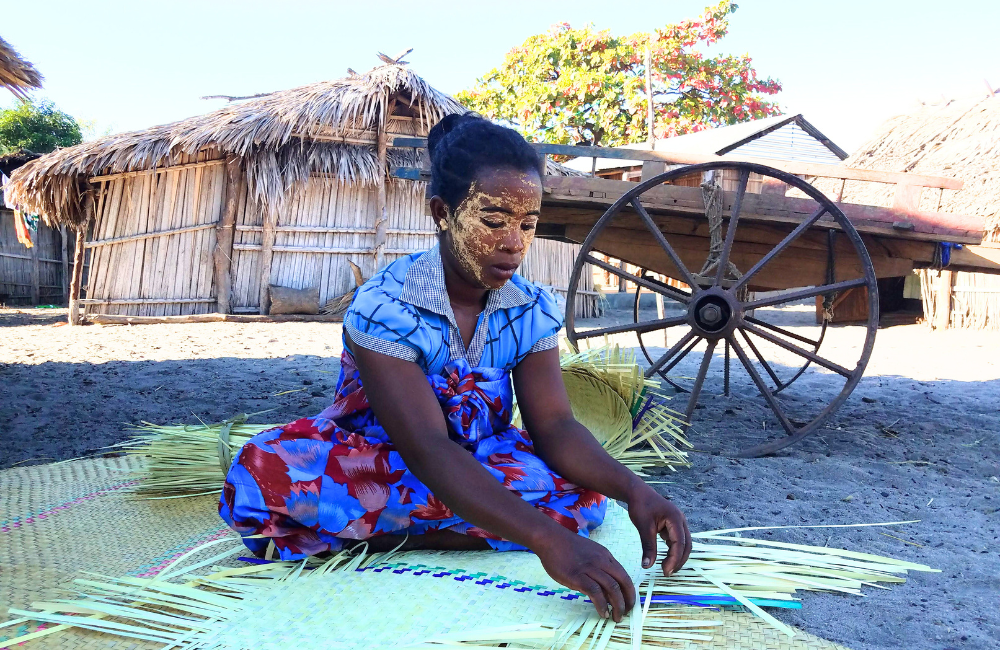
A woman in Madagascar weaves traditional mats, part of the livelihood activities supported by our reforestation project. Our NbS project empowers women through income-generating crafts and fair employment.
calls for ending discrimination, ensuring equal participation, and expanding economic opportunities for women and girls. While this goal is often associated with education, healthcare and governance, it is just as relevant in the context of environmental work, especially in communities where women rely on natural resources for their livelihoods.
Many of the projects supported by Earthly are built on community involvement, and in many cases, they prioritise or directly benefit women through:
Job creation
in restoration, sustainable agriculture, seed collection, or forest monitoring.
Capacity-building and skills training
tailored to local women, improving income security.
Leadership roles
for women in project governance and community engagement.
Improved access to resources
such as finance and
education,
including scholarships that support long-term learning opportunities.
By investing in projects that value and empower women, Earthly contributes directly to the SDG 5 targets, particularly:
Target 5.5:
Ensure full participation in leadership and decision-making.
Target 5.a:
Reform policies to give women equal rights to economic resources and ownership.
Target 5.b:
Enhance the use of enabling technology and skills.
Many of Earthly’s nature-based projects actively support women’s empowerment:
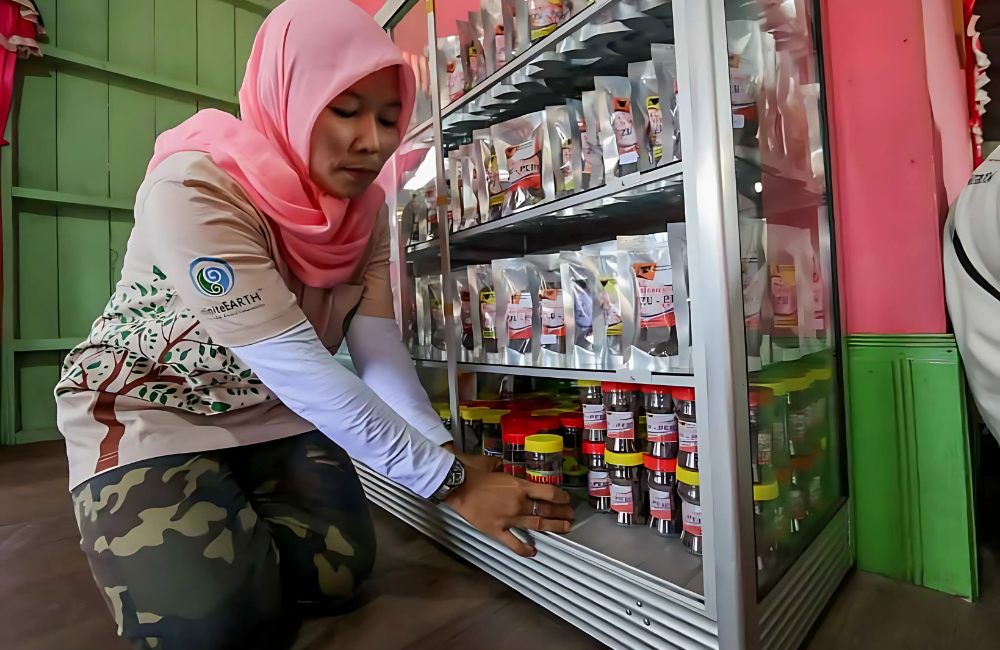
A member of the women’s cooperative at Rimba Raya in Indonesian Borneo stocks products from one of their micro-enterprises, Zuper Shrimp Paste. These initiaives provide income, independence, and leadership opportunities.
To date,
has created 52 local jobs, including 17 roles filled by women. As part of its social development goals, the project prioritises fair employment by directly hiring from nearby communities and ensuring women are included in restoration and conservation work.
In addition to job creation, the project supports
women-led entrepreneurship
through the launch of a dedicated
women’s cooperative (COOP)
. This initiative empowers women to develop and run their micro-enterprises, including:
Zuper Shrimp Paste
Chicken and egg farming
Salted fish production
Traditional handicrafts
These activities contribute to household income and offer women greater financial independence, decision-making power and social recognition.
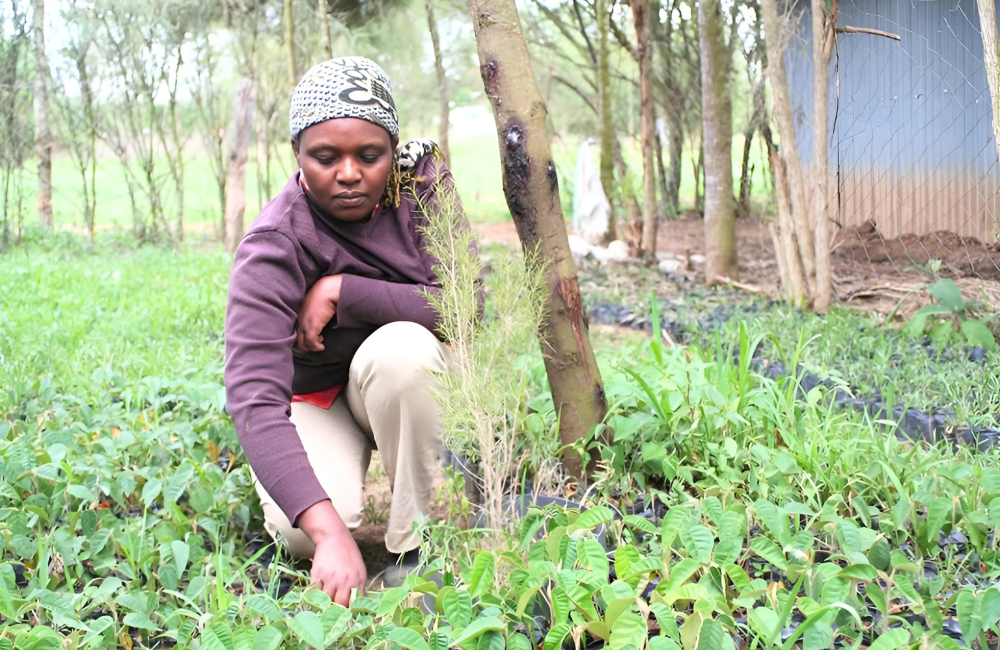
A TIST participant tends to tree seedlings in Kenya. Women make up 50% of TIST’s leadership and 41% of all participants, reflecting the project’s strong commitment to inclusion and women-led climate action.
promotes women’s empowerment by embedding inclusion into its structure. Women are not just participants in tree planting, they are leaders in the programme’s long-term management and monitoring.
Today, 50% of TIST’s leadership in Kenya is made up of women, and 41% of its total participants are women, many of whom are smallholder farmers. Through this model, women gain access to sustainable income, skills development and roles in local governance, helping to reshape traditional gender roles in rural communities.
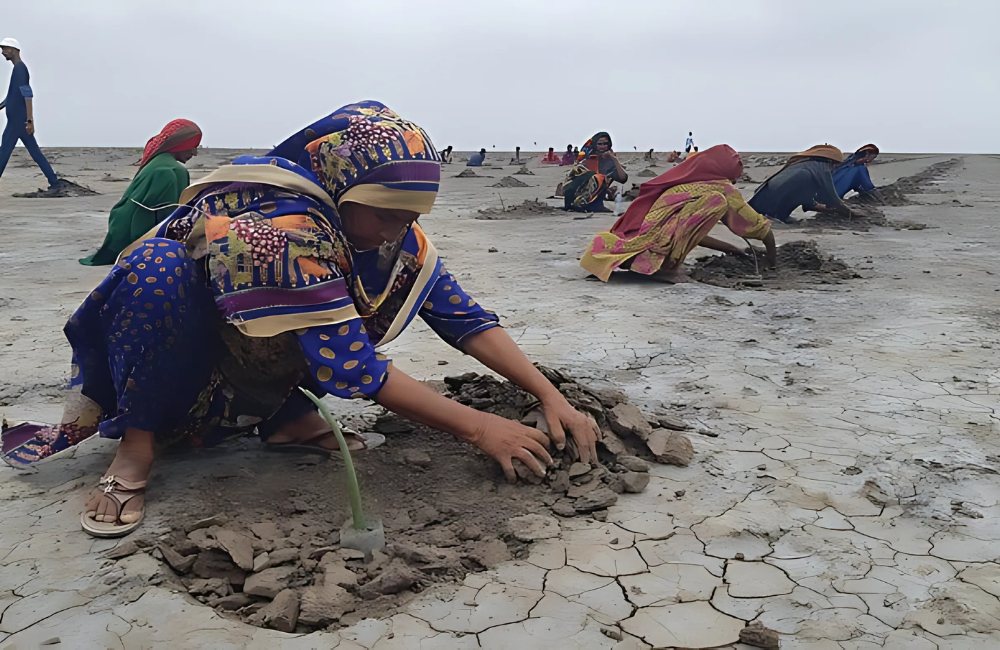
Women plant mangrove saplings along the Indus Delta in Pakistan. In a country where only 22% of women participate in the labour force (World Bank, 2022), projects like this highlight how NbS can create opportunities for women.
integrates social equity into its restoration strategy by ensuring women’s inclusion in employment and capacity-building. Out of the 1,000 local jobs created through the project, 400 are allocated to women, marking a big step in expanding access to income and formal work in rural coastal communities.
This commitment was informed by a Social and Biodiversity Impact Assessment (SBIA), which shaped the project’s design around community needs. In addition to paid roles, the project supports training and education initiatives that further build women’s skills and participation in restoration work.

A woman nurtures seedlings in a forest nursery as part of Earthly’s native woodland restoration project in Sofala, Mozambique.
stands out for its strong commitment to community participation and gender equity. While providing local employment and ecosystem restoration, the project ensures that at least 50% of participants in decision-making processes are women.
What sets this project apart is its inclusive revenue-sharing model: 60% of carbon credit income is returned to the community through social and environmental investments. These funds are allocated by local subcommittees, who are tasked with guaranteeing that all decisions are gender-balanced and aligned with community needs.

A woman in Tigray, Ethiopia, sorts resin with her child on her back. This project supports women like her through fair employment and community-led development.
places a strong emphasis on inclusion by focusing on underrepresented and vulnerable groups. Women make up 40% of all project participants, ensuring they have access to training, income opportunities, and involvement in restoration activities.
The project also supports women affected by HIV and sexual violence, helping to rebuild dignity, social belonging, and economic independence. By actively engaging those who are often excluded, the project helps reduce discrimination and creates space for women and other vulnerable groups to participate fully and equally in environmental and community initiatives.
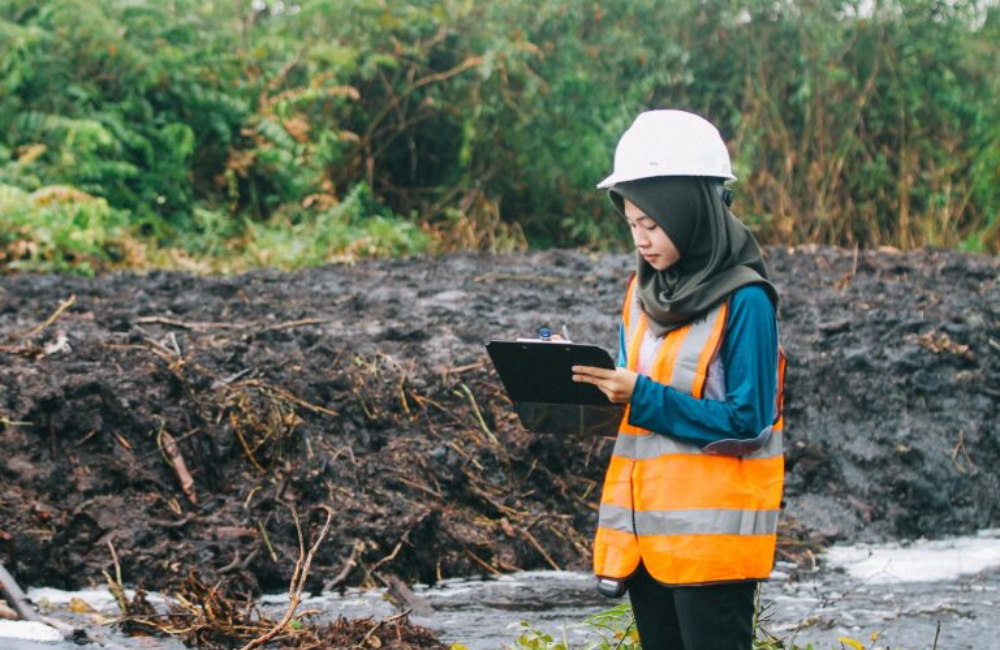
A woman monitors peatland restoration in our project in Indonesia. Earthly’s projects support women participation in technical and leadership roles. According to UNESCO (2021), only 33% of researchers globally are women, with even lower representation in climate-related fields.
prioritises gender balance in staffing, aiming for 25% of all project roles to be filled by women. It also supports local women’s groups through targeted development programmes.
The initiative also prioritises access to education for girls and women through a scholarship scheme in surrounding villages. Between 2016 and 2019, 64 women were among 127 students supported through this initiative, three of whom have since returned as teachers, helping to uplift the next generation.

In rural India, nearly 75% of working women are engaged in agriculture, and many are now leading efforts in agroforestry, reforestation, and sustainable land management - Ministry of Rural Development, Government of India, 2022.
has so far involved 5,599 participants, including 2,072 women. This is particularly significant given that
in India, yet often lack equal access to land, credit and training. By involving women directly in tree planting and agroforestry practices, the project helps close these gaps, offering more equitable access to income and decision-making within rural farming systems.
At Earthly, we carefully assess every project we support to ensure it delivers what it promises, not just in climate and biodiversity impact, but in real, measurable benefits for communities on the ground. Each project undergoes rigorous due diligence and is certified by trusted standards such as VCS, CCB, and Plan Vivo.
We prioritise
that create lasting change, including those that advance women’s empowerment through fair employment, leadership, and equal access to resources.
If your business is looking to invest in high-integrity climate solutions that also uplift people,
. We’ll help you ivest in a project that aligns with your values and makes a measurable difference.
Related articles